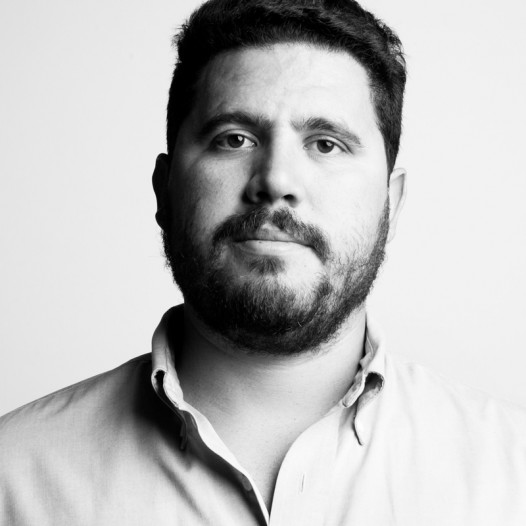Voices on Violence arose as a response to the Mother’s Day shootings in New Orleans that injured 20 people. Comprised of one-on-one interviews with a diverse group of residents, the series explores why and how people live here, how they assess risk, and what specific things they believe can help change the cycle of violence in New Orleans. The interviews will appear daily this week at NolaVie, as well as on air at 4:45 p.m. on WWNO radio, 89.9 FM, the local NPR affiliate. Please join the conversation; send commentary, responses and interview suggestions to voices@nolavie.com.

Marco Topete (photo by Jason Kruppa)
Who: Marco Topete, 30, a Mexican immigrant who came to New Orleans in 2005 with other members of the Texas Volunteer Firefighters Association as part of the initial search and rescue efforts following Hurricane Katrina. An engineer by training, who has fallen in love with the endless possibilities of New Orleans culture, Marco is a husband; the father of a 1 year old son; the owner of a start-up construction and design company; and an active member in the Intergalactic Krewe of Chewbacchus, a 3-year old Mardi Gras krewe that celebrates nerdiness … and the drunken sacred Wookie.
In his own words, here’s what Marco has to say about:
How it all started: I was invited to the city with the Texas volunteer firefighters to do open-water rescues after Hurricane Katrina. It was hard because people needed your help, but they didn’t want it. We would walk around properties or come through on boats, and you’d hear people taking shots at the rescuers. Later on, some of them would come forward to say “thank you.” It was very difficult, but I just attribute it to the shock of the storm.
How he has changed: When I first moved here, I was a single man with no one to take care of. I had a studio apartment in the Bywater, and I could just walk to the bars and have some fun, never really caring about the consequences.
Fast forward six years, and I live in the same neighborhood, but now I know every decision I make could affect my son. My wife and I are coming to terms with the fact that there are areas of town we just can’t explore with a kid. One time we went to this burger place on Freret Street. When we left, we were looking at some of the shops and then, Ember, my wife, saw some shops further down and wanted to continue to explore. But between the place we were standing and the shops Ember wanted to visit, were two blocks that were completely dark. Anything could happen amongst those blocks, and you just don’t want to become another statistic.
How New Orleans has changed: Within my circle of friends, it seems like everyone has that one story of violence – of being mugged or robbed or shot or stabbed or knowing someone who has been.
Awhile ago, you could isolate yourself from violence and stay bound in those areas where you knew you were going to be safe. People had a false sense of security that you were safe as long as you didn’t move into those areas where crime is happening. But now, the city is slowly showing us that that is not the case anymore. Our little isolation bubbles are getting smaller and smaller.
How it’s worth the risk: People fall in love with this town. It’s easy to live here in a way. People seem very open to starting relationships so you form this close knit group of social interactions. It feels like you live in this tiny little town.
How to do something about the violence: We have two fragmented parts in this city. It is a huge thing in this town to be a black New Orleanian or a white New Orleanian. There’s a lot of us vs. them. Anyone who says it doesn’t exist is choosing to ignore it.
We need to be more all in this together, to make sure there are activities for kids to grow up in and trust.
Voices on Violence: Conversations about life in New Orleans is a NolaVie/WWNO series that features individual interviews with the city’s residents. If you would like to be interviewed, or to comment on the series, email voices@nolavie.com.
 NOLAbeings Multimedia artist Claire Bangser created NOLAbeings as a portrait-based story project that marries...
NOLAbeings Multimedia artist Claire Bangser created NOLAbeings as a portrait-based story project that marries...  Voodoo in New Orleans: Reviving history: New Orleans fortune telling This article takes a deep dive into the history of Voodoo in New Orleans, its hybridization with Catholicism, and its present-day place in the city's culture. The author visits fortune-tellers in the French Quarter, using their guidance as a tool for introspection rather than a deterministic predictor of the future. Through her experiences in New Orleans, the author feels a mystical connection to both the past and the future.
Voodoo in New Orleans: Reviving history: New Orleans fortune telling This article takes a deep dive into the history of Voodoo in New Orleans, its hybridization with Catholicism, and its present-day place in the city's culture. The author visits fortune-tellers in the French Quarter, using their guidance as a tool for introspection rather than a deterministic predictor of the future. Through her experiences in New Orleans, the author feels a mystical connection to both the past and the future. 
[…] The bubbles of safety are getting smaller […]